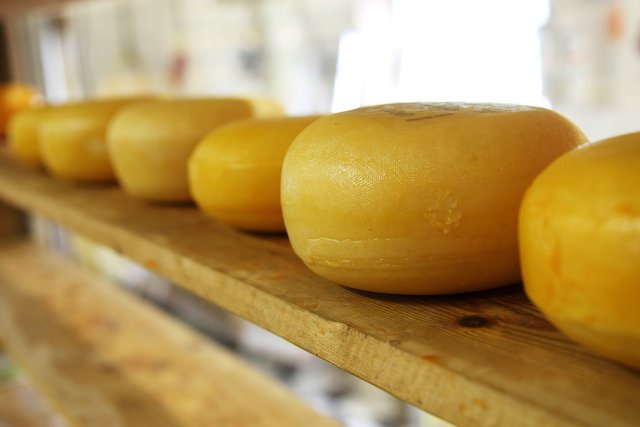
The term Pecorino designates each of the six Italian cheeses (Romano, Toscano, Sardo, Filiano, Crotonese, and Siciliano) that are so designated as being produced entirely from sheep's milk. Note that the names correspond with Italian regions or provinces. Also note that American cheeses that are also called Pecorino derive from Cow's milk because the American dairy system and American tastes are built about cow milk.
As a member of the European Union, Italy acquired legal protection of the process for making the Pecorino cheeses. Pecorino Romano, for example, a cheese developed as a key component of the diet of Roman soldiers, is still hand salted as it ages, just as it was during the time of the Roman Empire. There are variants of these cheeses, mostly due to village traditions of adding some kind of nut, truffles, or honey to the cheese. Some additives cross boldly into the "What are thinking?" category, such as the variant called Casu Marzu, in which larvae of a fly (the cheese fly) are embedded into the cheese to cause the cheese to ferment. Casu Marzu literally means "rotten cheese."
Americans are more familiar with Pecorino Romano. Usually it is labeled as grated Romano Cheese. One sprinkles it onto Italian dishes the same way that Parmesan Cheese is applied. Romano is saltier and sharper, and more so of both the longer that the cheese wheel is aged. Apparently, the Roman soldiers appreciated those qualities that aging produced.
I found three references to cheese or curds (curdled goat milk) in the Christian Bible. Butter is mentioned more often, but cheese does not appear to have been a mainstream food in the Hebrew or the Arab diets. As mentioned, the Romans made and provided cheese to their soldiers commonly in their food rations. Roman government and soldiers were common in Judea during the time of Jesus' ministry. So, the Hebrews knew of it as a provision that came with and supported their conqueror. However, a verse in the Old Testament of the Bible reveals a different conclusion about cheese.
Web search 1 Samuel 17:8. The Book of Samuel was authored by Samuel, the Hebrew Prophet who lived between 1070 and 1012 BC (the number of years before the birth of Jesus, the Christ). Samuel's time was during the first dynasty of Hebrew Kings (Saul) and more than 500 years before the Romans had an empire. The Hebrew people had occupied the land of Canaan that God had promised to them, settling the land to raise livestock and to farm. Perhaps cheese was simply a product of goats they kept and herded.